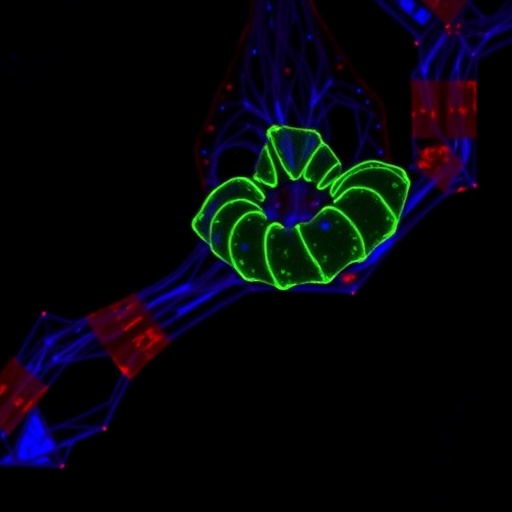In a groundbreaking study poised to redefine our understanding of testicular biology, researchers have unveiled a sophisticated molecular axis that governs macrophage polarization, a critical process for maintaining the homeostatic integrity of the testicular microenvironment. The intricate interplay between RNF8, OPTN, and KDM6A proteins orchestrates a delicate balance within the immune landscape of the testes, ensuring optimal reproductive function and protection against inflammatory insults. This discovery not only offers profound insights into testicular immunoregulation but also opens novel avenues for therapeutic intervention in male infertility and testicular pathologies.
At the heart of this study lies the pivotal role of macrophage polarization—a dynamic process where macrophages adapt to diverse functional phenotypes in response to microenvironmental cues. The testicular milieu demands a highly regulated immune environment, balancing immune tolerance necessary for sperm development and immune defense against potential pathogens. The researchers have illuminated how the RNF8/OPTN/KDM6A axis precisely modulates this balance, steering macrophages towards phenotypes that uphold testicular homeostasis.
RNF8, an E3 ubiquitin ligase traditionally recognized for its role in DNA damage response, emerges here as a key regulator beyond genome integrity. By interacting with the autophagy receptor OPTN, RNF8 influences selective autophagic processes within testicular macrophages. This relationship finely tunes the intracellular signaling cascades that dictate macrophage polarization states. Through ubiquitination-dependent mechanisms, RNF8 modifies OPTN activity, effectively coupling immune signaling with cellular degradation pathways.
.adsslot_L1uxnMsbHv{ width:728px !important; height:90px !important; }
@media (max-width:1199px) { .adsslot_L1uxnMsbHv{ width:468px !important; height:60px !important; } }
@media (max-width:767px) { .adsslot_L1uxnMsbHv{ width:320px !important; height:50px !important; } }
ADVERTISEMENT
OPTN serves as a versatile adaptor in autophagy and innate immunity, bridging ubiquitinated cargo to autophagosomes. In this context, OPTN’s interaction with RNF8 facilitates the selective removal of pro-inflammatory signaling complexes, restraining macrophage activation that could otherwise compromise testicular function. The study details how this fine-tuned modulation suppresses excessive inflammation while promoting a phenotype conducive to tissue repair and homeostasis.
Integral to this axis is KDM6A, a histone demethylase with a profound epigenetic impact on gene expression in macrophages. By demethylating histone H3 lysine 27 (H3K27), KDM6A activates transcriptional programs pivotal for anti-inflammatory macrophage polarization. The researchers demonstrate that the RNF8/OPTN complex enhances KDM6A recruitment and activity at genomic loci critical for macrophage function. This epigenetic regulation establishes a durable macrophage phenotype aligned with testicular immune privilege.
The implications of this tripartite molecular axis extend into the broader realm of male reproductive health. Male infertility, often linked to aberrant inflammatory states within the testes, could be markedly influenced by disruptions in macrophage polarization. The novel insights from this research suggest that targeted modulation of the RNF8/OPTN/KDM6A axis might restore immune balance, offering hope for therapeutic strategies in idiopathic infertility cases where inflammation plays a covert yet destructive role.
The methodology employed merges cutting-edge molecular biology with advanced immunological profiling. Utilizing conditional knockout mouse models alongside in vitro macrophage polarization assays, the team dissected the specific contributions of each component. Chromatin immunoprecipitation and ubiquitination assays further clarified the mechanistic links, while transcriptomic analyses illuminated downstream gene networks affected by this axis. The integrative approach lends robustness, validating each step of the proposed regulatory pathway.
Importantly, the study sheds light on how environmental stressors or pathological insults might disrupt this regulatory axis. Aberrant ubiquitination or epigenetic dysregulation in macrophages could tilt the immune balance towards a pro-inflammatory state, triggering chronic testicular inflammation or autoimmune orchitis. Understanding these mechanisms provides potential biomarkers for early detection and intervention, paving the way for precision medicine in male reproductive disorders.
The findings also resonate with emerging themes in immunometabolism. Given that macrophage polarization is tightly linked to metabolic reprogramming, the role of RNF8 and OPTN in autophagic pathways suggests metabolic crosstalk that influences epigenetic enzymes like KDM6A. This intersectional viewpoint encourages future research into metabolic modulators as co-therapeutic targets to reinforce testicular immune homeostasis.
Moreover, the research highlights the importance of cellular quality control systems in maintaining tissue-specific immune regulation. Autophagy, often relegated to a housekeeping role, is here positioned as a central player in immune adaptation. This elevates our appreciation for degradative pathways in shaping immune cell identity and function within complex organ systems, extending potential relevance beyond the testes.
The study’s revelations prompt reconsideration of existing paradigms in testicular immunology. Previously, macrophages were often seen as passive bystanders or simple effector cells; however, the intricate molecular choreography described here positions them as active architects of tissue equilibrium. This shifts the focus towards understanding macrophage-centric networks and their integration with other somatic and germ cells in the testes.
Clinically, these insights beckon the development of small-molecule modulators or biologics aimed at fine-tuning the RNF8/OPTN/KDM6A axis. Such therapeutic tools could complement existing treatments for inflammatory or autoimmune testicular disease, representing a move towards mechanistically informed and targeted therapeutics. The translational potential is immense, galvanizing efforts towards drug discovery in reproductive medicine.
In summary, this pivotal research elucidates a novel molecular axis core to the immune homeostasis of the testicular microenvironment. By bridging ubiquitin signaling, autophagy, and epigenetic regulation, the RNF8/OPTN/KDM6A pathway emerges as a master regulator of macrophage polarization. This discovery not only advances fundamental biology but also charts a promising course for clinical innovation in male reproductive health.
Subject of Research:
The regulation of macrophage polarization via the RNF8/OPTN/KDM6A molecular axis to maintain homeostasis in the testicular microenvironment.
Article Title:
The RNF8/OPTN/KDM6A axis controls macrophage polarization to maintain testicular microenvironment homeostasis.
Article References:
Guo, Y., Xia, P., Tian, Y. et al. The RNF8/OPTN/KDM6A axis controls macrophage polarization to maintain testicular microenvironment homeostasis. Cell Death Discov. 11, 339 (2025). https://doi.org/10.1038/s41420-025-02641-3
Image Credits: AI Generated
DOI:
https://doi.org/10.1038/s41420-025-02641-3
Tags: autophagy in testicular macrophagesE3 ubiquitin ligase functionsimmune landscape of testesimmune regulation in male fertilityimmune tolerance in sperm developmentmacrophage polarization in testesmale infertility therapeutic targetsmolecular mechanisms of testicular biologyRNF8 OPTN KDM6A testicular macrophagesselective autophagy in macrophagestesticular microenvironment homeostasistesticular pathologies and inflammation





